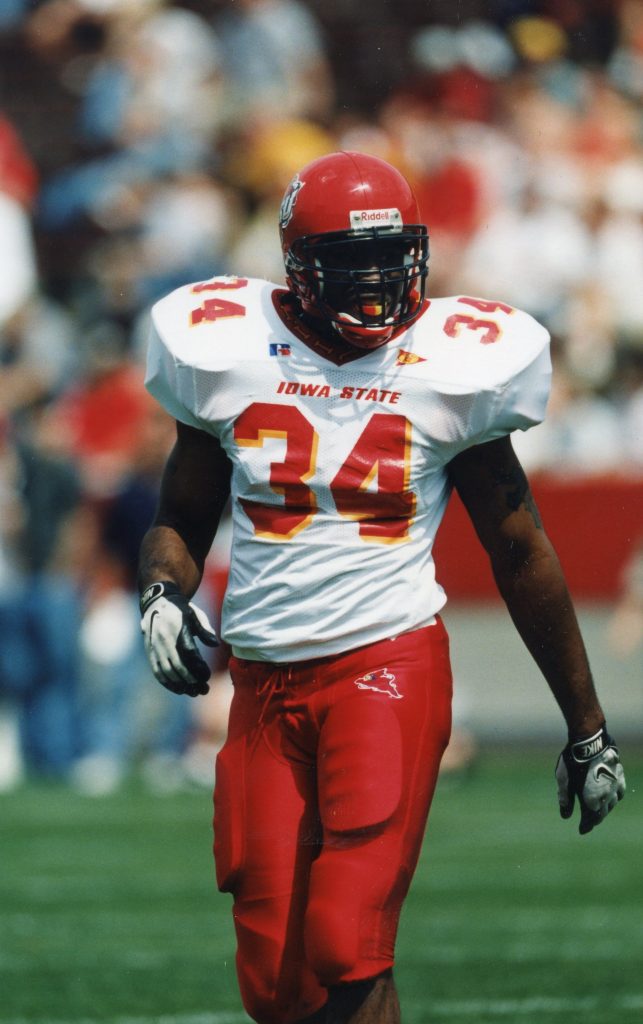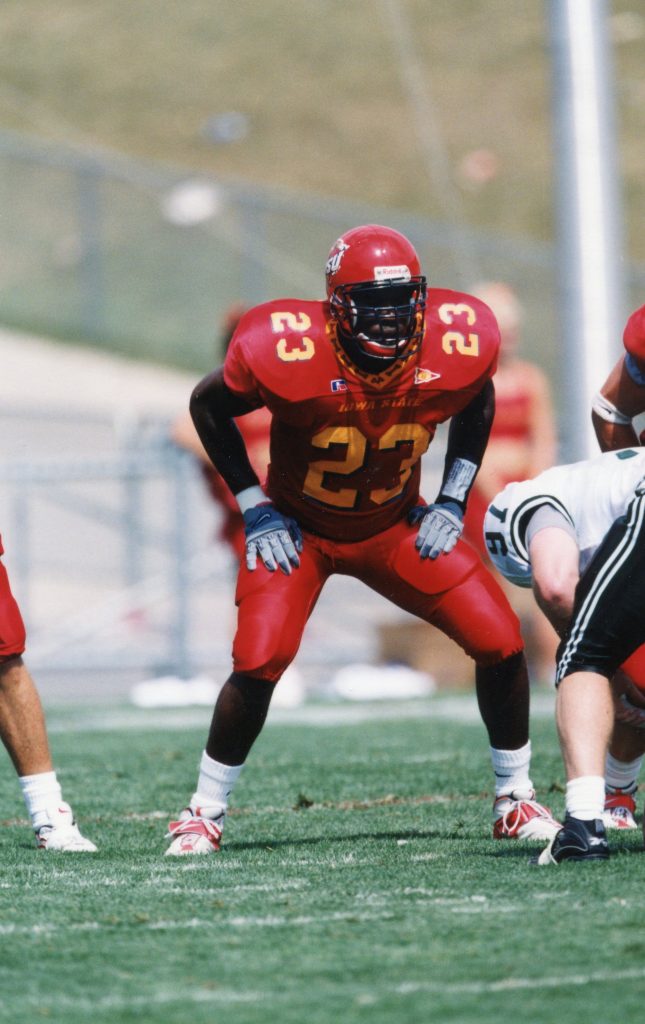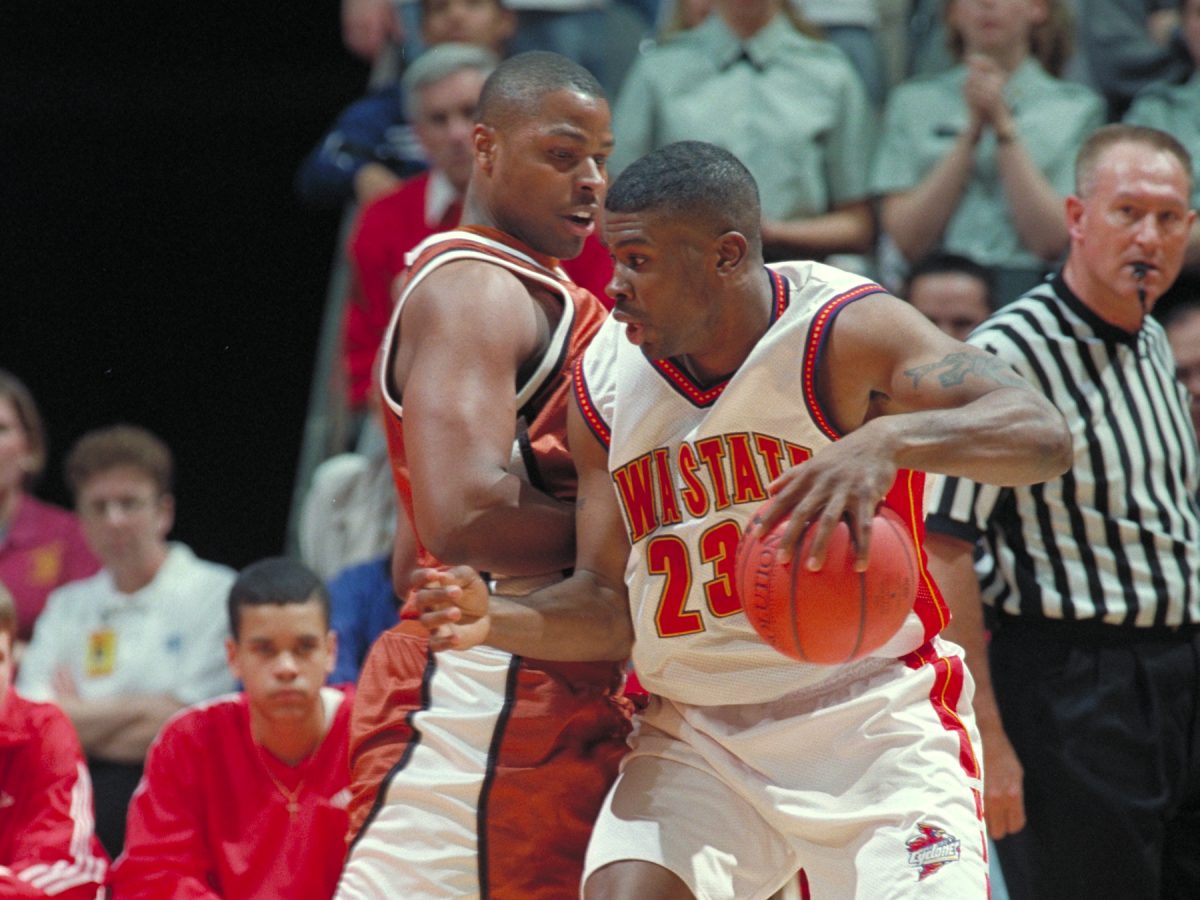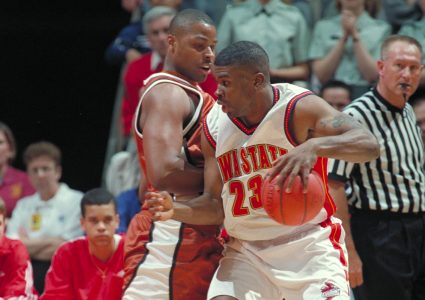Former ISU great Stevie Johnson played on the Larry Eustachy-coached Elite Eight basketball team in 2000, then played on the Dan McCarney-coached football squad that won nine games — a program record. (Photo courtesy ISU Athletics Communications)
Editor’s note: This story was originally published on Cyclone Fanatic on Feb. 13, 2017. In light of the recent cancelations in sports due to the coronavirus outbreak, we have decided to re-run one of Rob Gray’s Where Are They Now features every Tuesday and Thursday.
Like any college basketball fan, he scans the NCAA Tournament bracket every year.
He carefully weighs the early matchups, charts who’s hot and who’s not, and finally, puts pen to paper, crossing out the words, “Michigan State.”
He knows that’s a mistake, but to this day, Stevie Johnson can’t bring himself to make the Spartans a pick to click in March, despite their propensity to be at their best on the sport’s grandest stage.
The multi-talented former Iowa State standout knows that from experience, of course. Nearly 17 years ago, Michigan State shattered his dream of playing in the Final Four. His college basketball career ended in the Elite Eight — and at the time, he dwelled on the missed opportunity rather than the impressive achievements that marked that 1999-2000 season.
“Going to the Elite Eight was great but I couldn’t appreciate that because I felt like we didn’t play our best,” said Johnson, who averaged 9.1 points and 6.1 rebounds during that splendid season that ended in the controversial 75-64 loss at The Palace of Auburn Hills. “We played against a great team, but there’s so many small things — I just remember small things about the game. That’s what coach (Larry Eustachy) harped on all the time, the small stuff. and If I would have done this, or I would have done that, the outcome could have been different.
“I don’t remember a whole lot about the game. I’ve never watched it. In my brackets, every year I still pick against Michigan State even though I know they’re going to win. But it was an unreal feeling to get to that game and get that far and knowing the sacrifices, all the hard work we put in to get there. I don’t think any of us really appreciated it at the time.”
They do now. Everybody with even the slightest affinity for the Cardinal and Gold does — and did. So what did Johnson do when the loss still stung? He went back to work.
Within weeks of that stinging loss, he refused to dwell on the what-ifs. Instead, he asked, “What now?”
Fortunately, others on ISU’s campus had been asking that very question for years.
Guys like Paul Rhoads, who would attend basketball games and approach Johnson later, told him he’d be a great addition to the Dan McCarney-led football program he served as an assistant on.
“We would laugh it off,” Johnson recalled, “and I would say, ‘Yeah.’”
No one laughed when then-running backs coach Tony Alford stopped by for a chat during that Elite Eight-framed senior season, though.
“You know you could come back and play. One year, you could have eligibility for. You could play football,” Johnson recalls Alford saying.
No one laughed this time.
The possibility intrigued Johnson — who’d given up football as a sophomore in high school in part because his father, Cleo, was leery of the sport after serious knee and back issues ended his two-year NFL career far too early.
“It was just kind of mind blowing, you know?” Johnson said. “‘Yeah, I want to try it.’”
But Johnson wanted a second opinion, so he turned to his roommate for advice. Oh, and that roommate happened to be former Cyclone and NFL star Reggie Hayward.
“He was like, ‘Yeah, you should come out,’” Johnson recalled.
So it happened that Stevie Johnson made modern-day ISU history. He played a key role in helping the Cyclones roll within a few breaks of the Final Four, and possibly an NCAA title. Then he played linebacker on ISU’s only nine-win football team — and mere weeks separated the end of part one from the beginning of part two.
“Stevie made a great transition from basketball to football,” McCarney told Cyclone Fanatic in a text message. “It is one thing dreaming about it, talking about it, and another thing being a major success story on a history making team. Stevie had height, length, athleticism and was extremely coachable.”
****
Johnson’s amazing athletic journey started with a plastic tee and a fearsome swing.
That’s right: All Johnson had as a seven-year-old in small-town and hardscrabble Beaumont, Miss. was T-ball.
“Baseball was my first love,” Johnson said. “We didn’t have a football team or basketball team for little kids, but we had T-ball.”
And he excelled. His team won a state title and would have qualified for a national tournament, but the players’ families didn’t have enough money to fund the expensive trip.
Johnson wouldn’t start playing basketball until junior high school.
So he reveled in hitting the baseball. Johnson says smacking home runs, putting his head down and circling the bases remains a favorite memory.
“I don’t know any better feeling than when you hit the ball and you know you hit it right and you don’t have to look at it and you know it’s gone,” Johnson said. “I don’t know that there’s a better feeling than that.”
He’d find one eventually. Two, really.
Johnson quickly developed a reputation as an exceptional athlete on the hardwood. He stood 6-foot-3 by the eighth grade. And man, could he rise up and finish.
“That summer, everything came, my speed — everything came to fruition,” said Johnson, who finished his ISU hoops career with 904 points and 605 rebounds. “I was dunking. We had more people coming to my junior high games because no one was dunking at the high school games.”
Johnson was even better at football, But dad’s experience-based skepticism of the sport’s safety — and seeing real-time evidence when a friend was injured — led to him hanging up his cleats as a sophomore.

“It was a bad taste,” Johnson recalled. “Me and my friends — I didn’t want to walk away from it because I loved it, but people were already pushing me towards basketball. My dad, he never wanted me to play football.”
Johnson aimed to please. So hoops it was. Life offers it’s twists and turns, though. And the next one led to Ames — and the first of two highly-demanding basketball coaches, Tim Floyd.
*****
I asked Johnson what it was like to play for both Floyd and Eustachy. He laughed.
“I was lucky enough to have those coaches,” he said. “They’re two of the greatest coaches I’ve ever been around. I think Coach Floyd really had a really great mind of how to put different pieces togeher. Coach Eustachy was so good at breaking you down to nothing and making you into that he wanted you to be, his vision for the team. It was very demanding. Playing at Iowa State prepared me for anything in life.”
Johnson — an elite scorer and prized recruit out of high school — swallowed his pride and plugged away. He accepted being an important member of the supporting cast. Rewards, after all, don’t always come in the form flashy statistics.
“I was tough enough and smart enough to guard bigger guys and rebound the ball really well,” Johnson said. “I bought into it. I bought into it that I can out-rebound anybody in this league. I can guard anybody in this league from a guard to a big man. So I was able to buy into it and believe in myself that I can do this and Iw as able to do it effectively and I believe that, ‘OK this is important.’ Because as a young kid, you don’t want to rebound and defend. You dont want to be, ‘I’ve got to get a rebound and kick it back out to a shooter’ That’s not fun.
“But I bought into this is going to help the team win. If I could get a rebound and kick it out for Kantrail (Horton) or Mike Nurse to shoot a 3, I felt good about that. I knew that I was a part of that play and I was able to see the game diferently. I learned so much about the game and how it should be played. Although you don’t want that role, on most teams you’ve got to have a guy like that. You’ve got to have a guy like me on that team for this team to be successful. If Im taking shots that Mike Nurse should be taking, maybe that’s not good. … I felt like if this is the only thing you’re going to let me do, I’m going to do it better than everbody. And that’s the way I felt.”
Still, he knew he could do more. He yearned to make larger contributions, but it turns out all he provided was more than enough. Much more — as the Elite Eight trip attests.
“Sometimes I probably wanted to quit,” Johnson said. “Sometimes I probably wanted to walk away — transfer. Because I came to Iowa State highly recruited and my career was a good team career. Individually, I always felt like a failure. When I went home to Mississippi and I would see my friends, they would be like, ‘Stevie, why are you playing like this on TV? You’re not shooting.’ They didn’t understand that I’m in a system and this is what I have to do to for my team to be succesful. This is what I’m here to do; this is what I’m told to do. I want to shoot. Everybody wants to be the star, but that’s not my role for this team. And that was tough. It wasn’t easy, but I built so much character from that. I think that contributed to my long career overseas because I never went to a team thinking I should be the star.”
He became one anyway. In Johnson’s 13 seasons overseas, he earned MVP honors in Iceland and became a mainstay among the elite levels in Spain. He finished up his successful career in Germany and now works as an insurance claims adjustor in Studio City, Calif.
He was built tough from the start, but learned humility from both his dad and mom, Evelyn and his dad. He learned how to handle adversity from his sister, Ramona, who was diagnosed with Lupus at 16-years-old.
“She never complained,” Johnson said.
*****
Johnson played in the 2000 ISU spring football game the very same day he attended the women’s basketball banquet.
That’s how closely his two banner seasons blurred into one history-making run.
“I literally had two weeks to decide,” Johnson said. “‘This is your future. Maybe you’ll never play basketball again. You should try football.'”
But where to start? Johnson hadn’t played at any level for roughly six years. Sure he was gifted athletically, but how could he find a way onto the filed in the rugged Big 12?
By following dad’s words by the letter:
“His biggest thing was you’ve got to work. That was his thing. When You’re sleeping, somebody’s working. And I adopted that.”
So Johnson’s journey began in the weight room. It transitioned from the play book to the film room and back again. He was a natural, but being so far behind in terms of concepts and techniques imperiled his rapid and ultimately successful move from the court to the gridiron.
“I didn’t know how to do anything and I’m learning concepts in football and football — a dummy can’t play football,” Johnson said. “There’s so many things in the game, so many things that you have to know and you have to be in the right spot. If you’re not, everybody’s going to know it. … If you don’t hit with the right shoulder, or if you don’t do this, you mess up everything. … I didn’t know what I was doing. I didn’t really know that this was a big deal until after. To be able to do that now, look back and think, ‘Man that was pretty neat’ — at the time I was thinking, ‘Man I’ve got to learn as much as I can, because I actually want to play a little bit.”
He played plenty, registering 17 tackles in 10 games.

“He was slippery like a snake vs. big, physical offensive linemen and had a real knack for pass coverage and making plays in coverage,” McCarney said. “Stevie brought a consistent, winning attitude and work ethic every day and was a complete joy to have on our bowl champion football team.”
Johnson helped the Cyclones seal their first-ever postseason win, a 37-29 triumph over Pittsburgh in the Insight.com (now, Cactus) Bowl.
That cemented his status as the only ISU athlete to play on an Elite Eight hoops team and a 9-win football team. Pretty special; both random and by design. Johnson never quit. Instead he steeled himself for each challenge by blending exceptional physical talents with extreme mental toughness and an unconditional team-first mentality.
Sports took him a long way. Determination and heart did the rest. He didn’t much care about being noticed, or written about — and to this day, people seem to want to cross his name off an Elite Eight-based list, too.
“I see people all the time and I’ll have on some Iowa State gear, and they’ll say, ‘Man, Iowa State had a great (basketball) team back in the day, you know, (Jamaal) Tinsley and (Marcus) Fizer,” Johnson said. “They don’t ever get my name —‘Were you on that team?’”
Johnson laughs again.
“‘Yeah, I was on that team,” he says, chuckling. “And I won’t say much more than that.”
No need. That home run ball’s still sailing toward the horizon, but Johnson’s looking up this time. He’s fondly looking back, too — and asking others to cross something important off their own lists.
“I love the people in Iowa,” Johnson said. “That’s like second home to me. The fans, I tell everybody, if you’ve never seen a basketball game, you have to go to Hilton to see a basketball game. For me, personally, I think that’s the best place in college basketball. But I’m biased. But if you want to see a game, I’ve heard of all these arenas, Camden Indoor Arena, go to Iowa State and watch a basketball game. You have to.”





